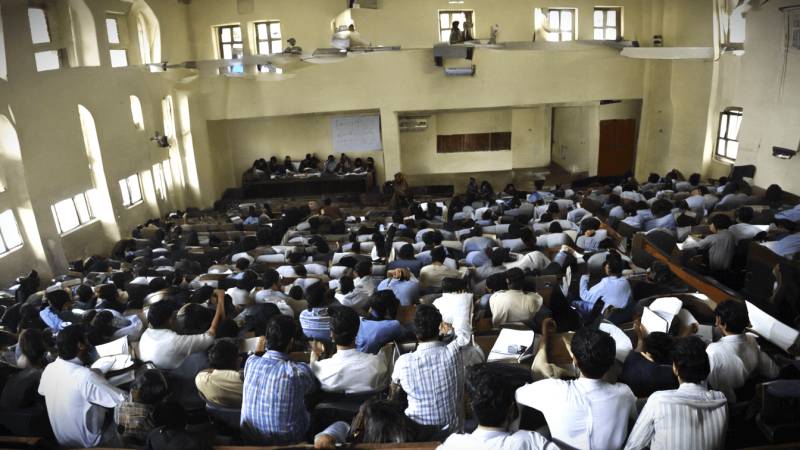
Leaders of higher education institutions in Sindh on Wednesday expressed concerns over the lack of training and motivation for students, as well as the need to inculcate elements of peace, speaking the truth, and respect for the state among the younger generation.
This was stated during a seminar titled "The State of Pakistan–Paigham-e-Pakistan: Challenges, Threats, Solutions, and Responsibilities of Institutions." The seminar had been organised by the Sindh Higher Education Commission at the International Centre of Chemical and Biological Sciences at the University of Karachi on Wednesday.
The seminar was attended by the vice-chancellors, pro-VCs, and deans of 67 universities from across Sindh, representing both the public and private sectors. The event focused on the critical role that higher education institutes (HEIs) can play in navigating and overcoming the challenges faced by the country while contributing to the nation's stability and progress.
During his keynote address, Mufti Abdul Rahim of Jamita Al-Rashid elaborated on the importance of Pakistan's religious foundations in combating extremist ideologies, saying that this initiative serves as a ray of hope for the nation and guides the youth towards moderation and constructive dialogue.
He said that educational institutions should focus on building students' character as well as imparting education. Terming fake news a big problem, he said that when the state is in trouble, even one incorrect piece of news could affect the whole state.
"We should speak the truth; our actions and deeds will be correct when we speak the truth."
Mufti Abdur-Raheem elaborated on the theological foundations of "Paigham-e-Pakistan" and its significance in countering extremist ideologies. He emphasised that this initiative serves as a beacon of hope for the nation and is instrumental in guiding the youth towards a path of moderation and constructive dialogue.
Sindh Higher Education Commission (HEC) Chairman Professor Dr Tariq Rafi said that Pakistan is currently undergoing a very difficult phase, and we all need to play our role in developing this country and fighting on our respective fronts.
Referring to the recent developments in Balochistan and Khyber Pakhtunkhwa, he mentioned that these incidents make it sad that somewhere our attitude and mindset are not on the right path. We must ascertain the reasons why our youth are influenced by all the negative things.
He mentioned that there is a lack of training in our universities and that we do not train our students. Rather, we just teach them to obtain a degree. It is necessary that universities should ensure training for and inspire students besides teaching them a curriculum.
He expressed hope that the participation of the vice chancellors of universities from across Sindh in the seminar will also ensure the promotion of Pakistan's message and the training and awareness of the students studying in the universities.
Mufti Ahmad Afnan, the director of Kulliya-Tush-Sharia at Ghazali University, said that Pakistan is an Islamic state and the government and forces of Pakistan are bound by the Constitution of Pakistan and take oath according to it, therefore, armed actions against the government or forces of Pakistan certainly fall in the category of rebellion, which is completely forbidden under the Sharia.
He mentioned that the suicide bomb attacks which are being carried out in Pakistan are a combination of three types of grave sins: one is suicide, the other is killing innocent people and the third is rebellion against a Muslim government.
Karachi University's VC Professor Dr Khalid Mahmood Iraqi said that children's character cannot be formed without spreading peace and raising words of truth, equality, and justice in society. He hoped that teachers could play a key role in building youngsters' character by fostering a constructive environment.
Ittehad ul-Madaris Al-Islamia President and member of the central Ruet-e-Hilal Committee Mufti Muhammad Yosuf Khan, Hayaat-e-Aaima-e-Masaajid Secretary General Allama Sheikh Asghar Hussain Shaheedi, Tanzeem-ul-Masajid Ahl-e-Sunnat Pakistan President Mufti Muhammad Abid Mubarak Madani, Jamiya-tul-Darasaat-al-Islamia Sheikh ul Hadees Mufti Yahya Majeed, and Ghazali University Pro-Chancellor Dr Zeeshan Ahmed spoke on the occasion. They emphasised the importance of religious harmony and the role of Islamic teachings in promoting peace.
They highlighted how the "Pakistan message" was of harmony with the true spirit of Islam, which advocates peace, tolerance and respect for diversity. They underscored the importance of religious harmony and the role of Islamic teachings in promoting peace. They also highlighted how "Paigham-e-Pakistan" aligns with the true spirit of Islam, which advocates for peace, tolerance, and respect for diversity.
The seminar concluded with a collective commitment to strengthen the "Paigham-e-Pakistan" initiative and work together for a peaceful and prosperous Pakistan. The participants agreed that this initiative is not just a policy but a movement that has successfully united various sections of society to achieve peace and stability.

